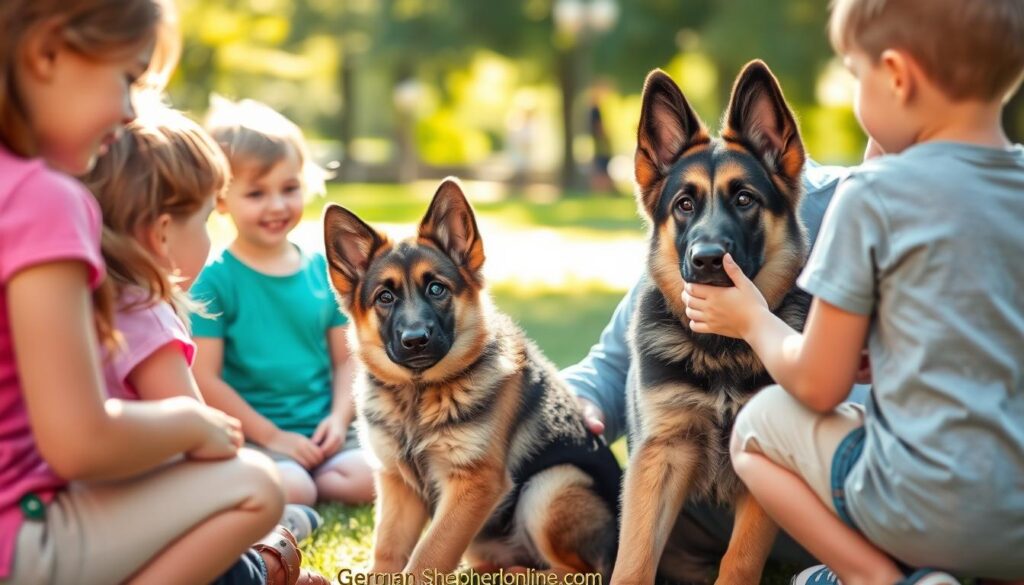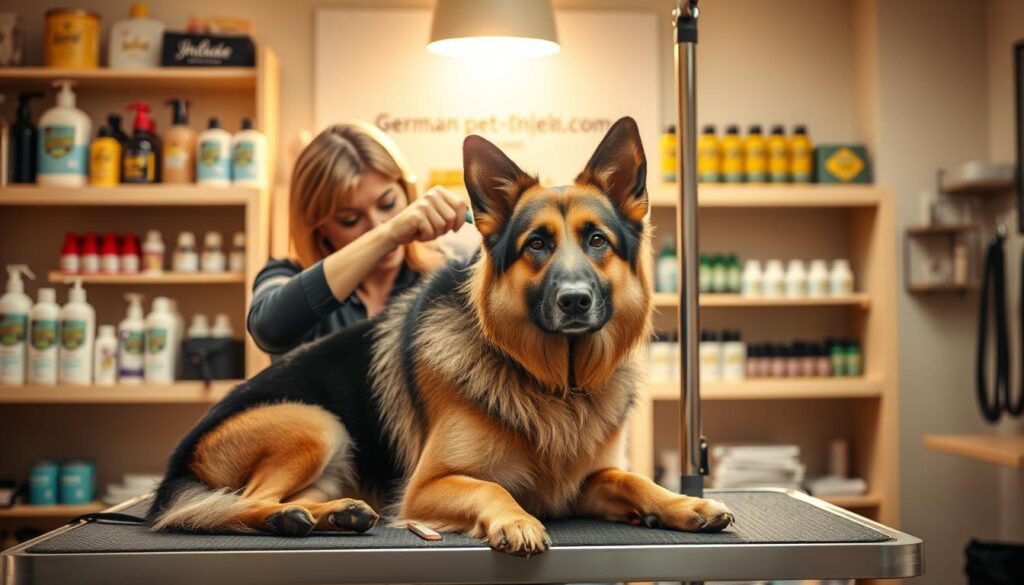As a German Shepherd owner, you’re passionate about giving your dog the best life. Yet, even with good intentions, common mistakes can harm your dog’s health and happiness.
You want your German Shepherd to be happy and healthy. But common mistakes like not getting enough exercise, getting bad training, and ignoring their health can hurt them a lot.
Knowing these common German Shepherd problems is the first step to avoiding them. This way, your dog can live a happy and healthy life.
Key Takeaways
- Avoid insufficient exercise for your dog
- Proper training is key for a well-behaved dog
- Regular health checks can prevent serious issues
- Socialization is vital for a well-adjusted dog
- Be aware of common behavioral issues
Understanding Your German Shepherd’s Unique Needs
Knowing what makes German Shepherds special is essential for their happiness and health. They are smart, loyal, and protective, making them a favorite among many. To take good care of them, you need to know their German Shepherd care requirements.
The Special Traits of German Shepherds
German Shepherds have traits that set them apart from other dogs. They are:
- Intelligent: They are very smart and learn quickly.
- Loyal: They are very loyal and make great family pets.
- Active: They need lots of exercise to stay healthy.
These traits show why German Shepherds need special care that matches their smarts, loyalty, and energy.
Why German Shepherds Require Different Care Than Other Breeds
Because of their special traits, German Shepherds need a different care plan than other dogs. They need:
- Regular exercise and mental games to keep them happy and prevent bad behavior.
- A healthy diet that gives them the energy and health they need.
Proper care for a German Shepherd means understanding and meeting these needs. This ensures they have a happy and fulfilling life.
The 7 Most Common Mistakes German Shepherd Owners Make
German Shepherds are known for their loyalty and smarts. To keep them happy and healthy, owners must avoid several common errors. By understanding and avoiding these mistakes, you can ensure your German Shepherd has a fulfilling life.
Mistake 1: Insufficient Exercise and Mental Stimulation
German Shepherds are high-energy dogs that need regular exercise and mental challenges to prevent boredom and destructive behavior. Not enough physical activity can cause obesity, joint issues, and other health problems. Make sure your dog gets at least 30 minutes of exercise twice a day, which can include walks, runs, or playtime in the yard. Also, provide mental stimulation through puzzle toys, obedience training, or scent work.

- Interactive puzzle toys filled with treats
- Obedience training sessions
- Scent work or hide-and-seek games
Mistake 2: Improper Training Approaches
German Shepherds are very smart and do well with structured training. But bad training methods can confuse, scare, and cause behavioral problems. It’s important to use positive reinforcement, like treats and praise for good behavior, instead of punishing bad behavior. Being consistent and patient is key to successful training.
Some tips for effective training include:
- Establishing clear rules and boundaries
- Using positive reinforcement techniques
- Being consistent and patient
Neglecting Physical Health and Proper Nutrition
Keeping your German Shepherd healthy and well-fed is key to being a good dog owner. German Shepherds face specific health problems. A good diet is vital for their health.
It’s important to know about common health issues in German Shepherds. Hip dysplasia can cause arthritis and mobility problems if not treated.
Mistake 3: Overlooking Common Health Issues
German Shepherds can get digestive issues and allergies. Regular vet visits help catch these problems early. Work with your vet to keep your dog healthy.
Some common health issues in German Shepherds include:
- Hip dysplasia
- Elbow dysplasia
- Gastrointestinal problems
- Allergies

Mistake 4: Providing Inadequate Nutrition
Feeding your German Shepherd a balanced diet is essential. A diet with high-quality protein sources like chicken or fish helps keep them healthy.
Different dogs have different nutritional needs. Puppies need more protein and calories than adult dogs. Active dogs need more calories to stay energetic.
To make sure your dog gets enough nutrition, consider these tips:
- Choose a high-quality dog food that meets your German Shepherd’s nutritional needs.
- Watch how much food your dog eats and adjust as needed based on their activity level and health.
- Don’t overfeed, as it can cause obesity and other health problems.
By paying attention to your German Shepherd’s nutritional needs, you can help them live a healthy, happy life.
Social and Behavioral Care Errors
Understanding your German Shepherd’s social and behavioral needs is key. Socialization and recognizing behavioral cues are essential. They help your dog become well-adjusted and confident.
Poor Socialization Practices
Socialization is vital for your German Shepherd’s growth. It means exposing them to new places, people, and animals. This helps them feel calm and confident in new situations. Poor socialization practices can cause anxiety, fear, and aggression. To socialize your German Shepherd well, you should:
- Expose them to different environments, such as parks and pet stores
- Introduce them to various people, including children and strangers
- Arrange meetings with other dogs and animals
This way, your German Shepherd will become confident and well-behaved around new people, dogs, and places.

Missing Important Behavioral Cues
It’s important to understand your German Shepherd’s behavioral cues. Paying attention to body language and signals helps you spot stress, anxiety, or excitement. Look out for:
- Tail wagging or tucking
- Ear positioning
- Posture and facial expressions
By noticing these cues, you can act quickly and avoid problems.
Environmental and Maintenance Oversights
Keeping your German Shepherd healthy is more than just food and shelter. You must also pay attention to grooming and create a safe, comfy living space.
Ignoring Grooming and Coat Care
German Shepherds have a double coat that sheds a lot. Neglecting their coat care can cause mats, tangles, and skin problems. To prevent these, do the following:
- Brush your German Shepherd 2-3 times a week.
- Choose the right grooming tools, like a slicker brush or rake.
- Bathe them often, but don’t overdo it to keep their coat’s natural oils.

Regular grooming keeps their coat healthy and helps spot skin issues early. One big pitfall of owning a German Shepherd is not realizing how important grooming is.
Creating an Unsuitable Living Environment
German Shepherds need room to move. Creating a good living space means giving them enough room to exercise and relax. Some top mistakes with German Shepherd dogs include not giving them enough space and not making their area secure.
To make a good living space, consider these tips:
- Give your German Shepherd a big, comfy place to rest.
- Make sure your yard is fenced well to keep them safe.
- Keep dangerous things out of their reach.
By focusing on these points, you can greatly improve your German Shepherd’s life and avoid common mistakes.
Conclusion: Becoming a Better German Shepherd Owner
As a German Shepherd owner, you have a big impact on your dog’s life. Knowing common mistakes can help you be a better owner. Avoiding mistakes like not enough exercise, bad training, and ignoring health issues can make your dog happier.
Understanding your German Shepherd’s needs and making small changes can make a big difference. This includes giving them the right food, socializing them well, and paying attention to their behavior. As you learn from mistakes, your bond with your dog will grow stronger.
Using what you’ve learned, you can become a more caring German Shepherd owner. This will make your dog’s life better and bring you joy too. Becoming a better owner is a journey. Every step you take will make your relationship with your dog more rewarding.
FAQ
What are the most common mistakes German Shepherd owners make?
Owners often don’t give their German Shepherds enough exercise and mental challenges. They might use the wrong training methods. They also ignore health issues, don’t feed them properly, and don’t socialize them well. They miss important signs of behavior and don’t take care of their coat and grooming.
How much exercise does a German Shepherd need?
German Shepherds need at least 1-2 hours of exercise every day. This should include both physical activity and mental challenges. It helps prevent boredom and bad behavior.
What are the best training methods for German Shepherds?
Positive reinforcement training works best for German Shepherds. This includes clicker training and reward-based training. They are smart and respond well to commands.
What are common health issues in German Shepherds?
German Shepherds often face health problems like hip and elbow dysplasia. They can also have digestive issues and allergies. Proper care and nutrition can help manage these problems.
How can I socialize my German Shepherd effectively?
Start socializing your German Shepherd early. Expose them to different places, people, and animals. This helps them become confident and calm in new situations.
What are the nutritional needs of a German Shepherd?
German Shepherds need a balanced diet. It should have high-quality protein, moderate fat, and complex carbs. They also need essential vitamins and minerals for their health.
How often should I groom my German Shepherd?
German Shepherds need regular grooming. Brush their coat several times a week. This prevents matting and reduces shedding.
What are the signs of behavioral problems in German Shepherds?
Behavioral problems include destructive behavior, too much barking, and aggression. These can be fixed with proper training, socialization, and attention to their emotional needs.
How can I create a suitable living environment for my German Shepherd?
Create a safe and comfy living space. Make sure they have enough room for exercise and a cozy place to rest. Protect them from extreme weather.
